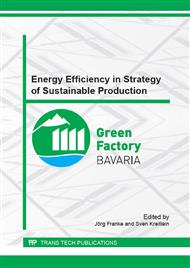p.3
p.11
p.19
p.25
p.32
p.38
p.46
p.53
The Relative Energy Efficiency as Standard for Evaluating the Energy Efficiency of Production Processes Based on the Least Energy Demand
Abstract:
This paper presents a calculation system to evaluate the energy efficiency in the production in general and at the process level more specifically. Its focus lies on the evaluation of the efficiency of the use of electric energy in the manufacturing industry. The basic target is a comparability of the energy efficiency across products through derivation of significant key figures. The basis of a significant evaluation and overarching comparability of the energy efficiency as well as the basis of the derivation of possible saving potentials is the relative energy efficiency (REE). It is determined by the quotient of minimal energy demand and actually measured consumption and requires that the actually measured energy consumption refers to an independent basis of comparison. The step-by-step development of the calculation system is based on the detailed analysis of all influential factors of the energy consumption. The, in this context, developed Least Energy Demand Method enables the determination of energy minima with different bases of comparison as reference values to evaluate the energy efficiency of single parts production.
Info:
Periodical:
Pages:
11-18
DOI:
Citation:
Online since:
November 2015
Authors:
Price:
Сopyright:
© 2015 Trans Tech Publications Ltd. All Rights Reserved
Share:
Citation:


